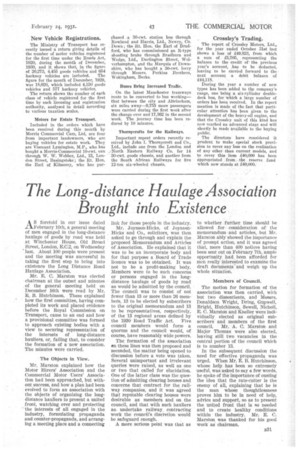The Long-distance Haulage Association Brought into Existence
Page 49

If you've noticed an error in this article please click here to report it so we can fix it.
AS foretold in our issue dated February 10th, a general meeting of men engaged in the long-distance haulage of goods by road was held at Winchester House, Old Broad Street, London, E.C.2, on Wednesday
• last. About 100 people were present and the meeting was successful in taking the first step to bring into existence the Long Distance Road Haulage Association.
Mr. E. C. Marston was elected chairman at the outset and minutes of the general meeting held, on December 16th were read by Mr. B. B. Hutchinson. These explained how the first committee, having completed its work and placed evidence before the Royal Commission on Transport, came to an end and how a provisional committee was formed to approach existing bodies with a view to securing representation of the interests of long-distance hauliers, or, failing that, to consider the formation of a 'new association. The minutes were carried.
• The Objects in View.
Mr. Marston explained how the Motor Hirers' Association and the Commercial Motor Users' Association had been approached, but without success, and how a plan had been evolved to form an association with the objects of organizing the longdistance hauliers to present a united front, watching over and protecting the interests of all engaged in the industry, formulating propaganda and counter-propaganda, and arranging a meeting place and a connecting link for those people in the industry.
Mr. Joynson-Hicks, of Joynsitn, Hicks and Co., solicitors, was then asked to go through and explain the proposed Memorandum and Articles of Association. He explained that it was to be an incorporate body and for that purpose a Board of Trade licence was to be obtained. It was not to be a profit-making body. Members were to be such concerns or persons engaged in the longdistance haulage of goods by road as would be admitted by the council. The council was to consist of not fewer than 13 or more than 26 members, 13 to be elected by subscribers to the original memorandum and 13 to be representatives, respectively, of the 13 regional areas defined by the 1930 Road Traffic Act. Five council members would form a quorum and the council would, of course, have reasonably wide powers.
The formation of the association en these lines was then proposed and seconded, the matter being opened to discussion before a vote was taken. Several unimportant and irrelevant queries were raised, as well as one or two that called for elucidation. One of the latter class was the question of admitting clearing houses and concerns that contract for the railway companies, and it was agreed that reputable clearing houses were desirable as members and on the council, and that with such hauliers as. undertake railway, contracting work the council's discretion would be safeguard enough.
A more serious point was that as to whether further time should be allowed for consideration of the memorandum and articles, but Mr. Marston ably showed the importance of prompt action, and it was agreed that, more than 400 notices having been sent out on February 7th, ample opportunity had been afforded for men really interested to examine the draft documents and weigh up the whole situation.
Members of Council.
The motion for formation of the association was then carried, wii h but two dissentients, and Messrs. Donaldson Wright, Dring, Gupwell, Bright, Hutchinson, Sewell, Nicholl, E. C. Marston and Kneller were individually elected as original subscribers and members of the first council. Mr. A. C. Marston and Major Thomas were also elected, leaving still two vacancies in the central portion of the council which is to number 13.
In the subsequent discussion the need for effective propaganda was urged. When Mr. E. B. Hutchinson, whose help has been so extremely useful, was asked to say a few words, he spoke of the importance of ousting the idea that the rate-cutter is the enemy of all, explaining that he is the man whose thoughtlessness proves him to be in need of help, advice and support, so as to present the united front that is so needed and to create healthy conditions within the industry. Mr. E. C. Marston was thanked for his good work as chairman.




















































































































